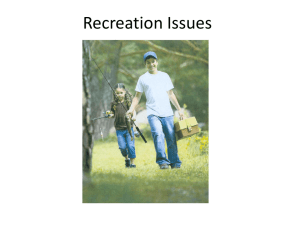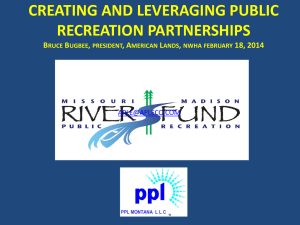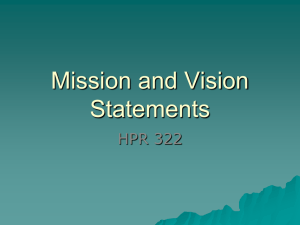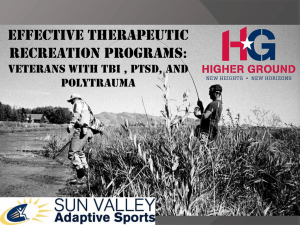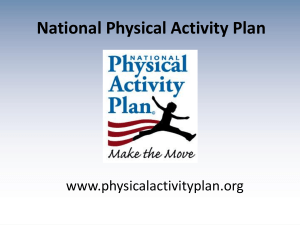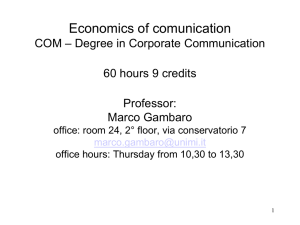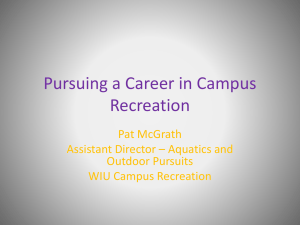RECREATION
advertisement
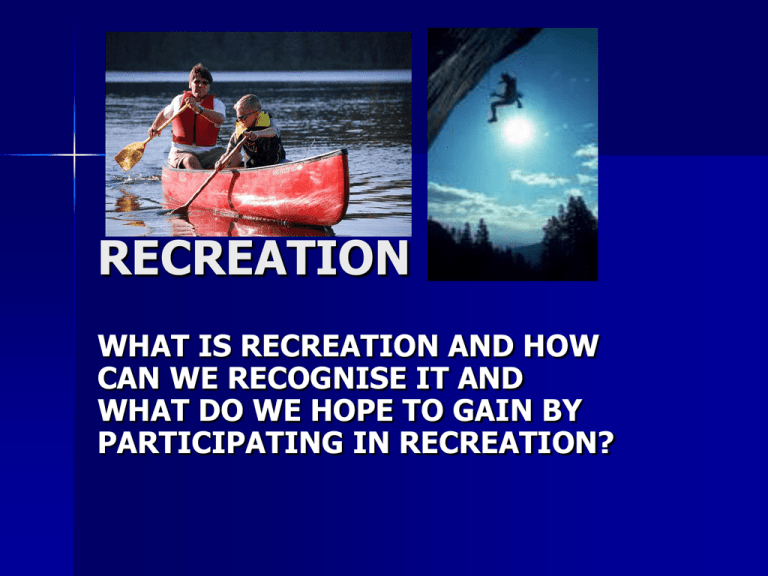
RECREATION WHAT IS RECREATION AND HOW CAN WE RECOGNISE IT AND WHAT DO WE HOPE TO GAIN BY PARTICIPATING IN RECREATION? IN THIS LESSON……… RECREATION PHYSICAL RECREATION OUTDOOR RECREATION WHAT DOES IT MEAN? The word recreation stems from the Latin word recratio, which means ‘to restore health’ Recreation is an active aspect of leisure, something useful, not simply a time left over after work, duties and so on. Key words that are appropriate for recreation include: Relaxation – a chance to escape Recuperation – recovering from stress Re-creation – to be creative These are often referred to as recreation’s ‘three rs’ DEFINITIONS Some definitions: Lumpkin – ‘Recreation refreshes or renews one’s strength and spirit after toil’. Kaplan – ‘ activity voluntarily engaged in during leisure and motivated by the personal satisfactions which result from it … a tool for mental and physical therapy.’ Parker – ‘ In its literal sense of re-creation, it may be seen as one of the functions of leisure: that of renewing the self or preparation for work.’ TASK – Write your own definition of recreation and list down your own recreational activities. NOT ONLY PHYSICAL…… Recreation can be viewed as: An extension of the ‘play’ experience A personal experience – the value to the individual The nature of an activity An institution and structural framework A process – what happens to the individual. DEFINITION WRITE YOUR OWN DEFINITION OF RECREATION AND LIST YOUR OWN RECREATION ACTIVITIES. ALSO, DESCRIBE AND EXPAIN HOW IT DIFFERS FROM PHYSICAL RECREATION. PHYSICAL RECREATION PHYSICAL RECREATION IS PHYSICAL ACTIVITY WITH A PLAYFUL ATTITUDE IN A RECREATIONAL ENVIRONMENT. TO PHYSICALLY RECREATE IS TO TAKE PART IN A GAME FOR ITS OWN SAKE – NOT FOR ANY EXTRINSIC REWARD. THE PROCESS……. PLAYED AT A RELATIVELY UNREFINED LEVEL SYSTEMS NOT BE STRICTLY ADHERED TO LIMITED RESOURCES AND DRESS CODE RELATIVELY UNSOPHISTICATED LEVEL OVERALL……………. PHYSICAL RECREATION IS MORE THAN JUST AN ACTIVITY – IT IS ALSO A POTENTIALLY VALUABLE EXPERIENCE. EXAMPLES……….. All intrinsic reasons. – This also accounts for the low status which sport often achieves in our society, in other words, if an activity has no external value it serves little function. Jogging, step aerobics, a knock-up in tennis and visiting a water ‘splash’ park are all recreational activities. They all involve physical exercise and the participants gain something from doing them. They are not sport as we have defined it, because there is no definite outcome, extrinsic reward or stringent organisation. LEISURE--------------RECREATION-------------PHYSICAL RECREATION> This model show that the continuum from leisure to physical recreation narrows as less people are involved. It will get narrower still when we look at sport. What causes this narrowing process? Opportunity Provision Esteem Income facilities In theory, physical recreation should be for everyone irrespective of age, ability or disability, gender, class or race. TASK COPY DIAGRAM ON P218 TO EXPLAIN: WHO WHERE HOW BENEFITS WHEN WHAT ABOUT OUTDOOR RECREATION? The simplest and most straightforward definition of outdoor recreation is simply the participation in any enjoyable, holistic activity (participation involves immersing your whole body in the activity, a complete commitment to the activity) in the outdoors, where the term outdoors refers to the natural, or at least rural, environment. ACTIVITIES COULD INCLUDE: RAMBLING FISHING HILL WALKING CYCLING Colin Mortlock explains the potential of outdoor recreation as follows: ADVENTURE WAYS ‘The following journeys, providing you take any of them to the outer limits of your capabilities in a self – reliant manner, can take you along the road to truth beauty, freedom and happiness.’ – To be gained ‘Up a mountain or down a river, across an ocean or along a coastline, across the wilderness or along the outdoor way, through the air or under the surface of the earth.’ THIS LOOKS NICE………. Artificial areas whilst others have to travel to them. Whether climbing, walking , canoeing or orienteering, the scenery of the countryside rewards our senses with beauty and variety. We get to see, feel, smell and hear things that are way outside our normal day-today existence. We are able to get away from the clutter of urban life and get in touch with the natural world. We can do simple things and get back to nature, we can experience and appreciate beauty – it can be indeed a spiritual experience, a time when we tune in to our deepest thoughts and feelings. To notice and appreciate things that would otherwise go unnoticed. RESPECT TO RESPECT THE NATURAL ENVIRONMENT Experiencing the natural environment and appreciating the pleasure and intrinsic values it has to offer means that one has to respect and sometimes abide by a strict code of conduct in order to preserve for future others to appreciate. We may feel concerned about issues such as preservation and pollution and have a greater interest in and understanding of the work of the Countryside Agency. As a result of more and more people moving around the countryside, it too brings its own problems of erosion, disturbance to the wildlife, litter etc. ADVENTURE TO FEEL A SENSE OF ADVENTURE AND PERHAPS RISK The environment is unpredictable, weather, tides, steepness of paths etc. this creates a feeling of risk, worry and even hazardous. The key to a positive experience of outdoor recreation is to avoid all real risk by using commonsense and by abiding strictly to safety codes, creating a feeling of real excitement and adventure – personal achievement can then be gained. In some cases, to find the inner self.
